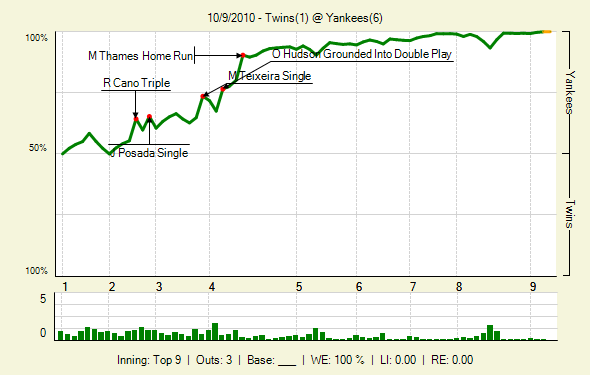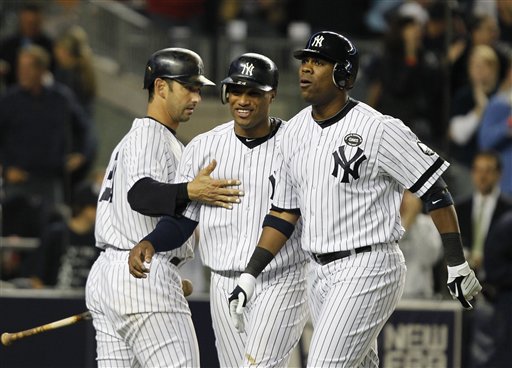Yanks’ depth picked up the slack in ALDS
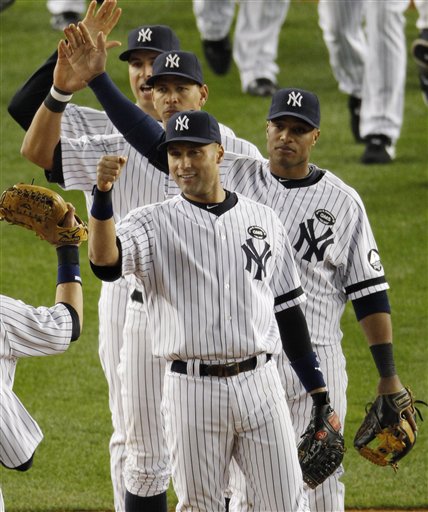
One of my favorite baseball truisms is that your best players have to be your best players if you want to succeed in the postseason, and there’s no better example of that than the 2009 Yankees. Alex Rodriguez got big hit after big hit, CC Sabathia took the ball as often as possible and dominated each time out, and Mariano Rivera nailed down every win along the way. If a team’s best players aren’t doing what’s expected of them, it’s very difficult to win in a short series. Unless, of course, you’re talking about the 2010 Yankees.
The Yanks more than doubled up the Twins during their three game ALDS sweep, outscoring them 17-7 (10-3 after the fifth inning). Other than the first six or so innings of the first game, the series really wasn’t all that competitive, as the Bombers imposed their will on the Twinkies pretty much every step of the way. Surprisingly, they did that with minimum production from three key players: Derek Jeter, A-Rod, and Brett Gardner.
Jeter, the leadoff hitter and supposed spark plug for the lineup, reached base a total of four times in 14 trips to the plate, all on singles. His batting line was an uninteresting .286/.286/.286, and he never even reached third base, let alone score a run. In fact he only made it as far as second base twice, the first time on Curtis Granderson’s bunt in Game Two, the other on a stolen base in Game Three. Jeter did single in the go-ahead run in the seventh inning of Game Two, but that was pretty much the extent of his offensive contribution during the series.
Gardner led the team in on-base percentage during the season (.383), but he only reached base a total of three times during the ALDS, picking up two singles and a walk in a dozen plate appearances. Both hits came in Game Two, the walk in Game One, and he stole just one base. So right there, you have the two key offensive cogs, the two guys that are supposed to get on base for the meat of the order, falling short of expectations.
More surprising than the lack of production out of Jeter and Gardner was A-Rod’s rather quiet series. He finished the season on a torrid hot streak (.306/.375/.649 with 12 homers in his last 28 starts), but singled just three times and walked once in the ALDS, driving in the first Yankee run of Game Two with a sacrifice fly. That’s the only run he drove in during the series, and even though his mere presence in the batter’s box and on-deck circle changes the game, Alex certainly didn’t have the same impact in the ALDS that he did last year.
And you know what? None of that was a big deal. The Yankee lineup has no soft spots, so they were able to absorb the struggles of Jeter, Gardner, and A-Rod and not miss a beat. Granderson had five hits including a huge triple in Game One and a big double in Game Two. The designated hitter platoon of Marcus Thames and Lance Berkman combined to go 4-for-11 with a double, a walk, and two homers. Nick Swisher and Mark Teixeira put their subpar 2009 postseasons behind them and combined for a .320/.371/.680 batting line, and Robbie Cano picked up A-Rod with a .333 batting average and zero single strikeouts. When one guy struggled, two others picked up the slack.
Most teams would have been dead in the water if their leadoff hitter and cleanup man failed to produce, not to mention their top on-base guy and basestealer. The Yanks have tremendous offensive depth and a circular lineup that can hurt you one through nine, certainly strong enough to offset three poor performances in a five game series. At some point, hopefully soon, Jeter, A-Rod, and Gardner will get back to doing what they’re capable of, and that should scare the crap out of the rest of the league.
Cutting out the cutter the key to Game Three
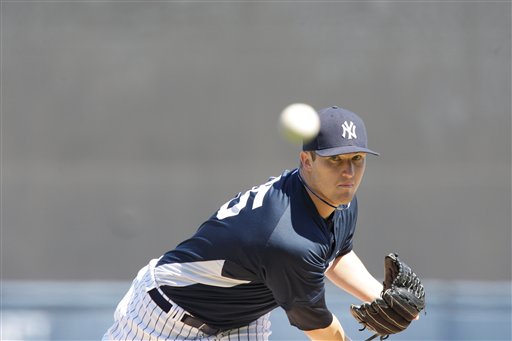
All season long, one of the staples of Phil Hughes starts were complaints about him relying too much on his fastball and cutter. Batters seemed to foul the pitches off at will, yet he continued to throw them deep in the count instead of trying to get swings-and-misses or weak contact on offspeed pitches. The changeup that supposedly won him the fifth starter’s job in Spring Training all but disappeared until a late season cameo. It worked fine for the first few weeks of the season, but after that it was a bit of a struggle.
Hughes threw his four-seam fastball 63.6% of the time this year, the cutter 16.4%, and the offspeed stuff the remaining 20%. He was even more predictable with two strikes, throwing either a four-seamer or cutter almost 85% of the time (I have it at 84.75%, unofficially). When you’re throwing some kind of fastball four out of every five pitches, it’s easy to see why hitters fouled off more than a quarter of his total pitches this season. Hughes simply got predictable, even more so the second and third times through the league.
On Saturday night though, Hughes and catcher Jorge Posada changed up their plan, but not by incorporating more offspeed stuff. They threw more four-seamers and fewer cutters, go with straight power over deception and movement. Just seven of the 99 pitches Hughes threw were cut fastballs, and five of those came in the first four innings (two in the same at-bat). The 18 curveballs he threw equals his regular season usage of the pitch for all intents and purposes, ditto the two changeups. It was a very straight forward attack plan, go right after them with the four-seam fastball and dare them to hit it.
There’s two reason why this approach worked. One, Hughes’ fastball was just that good that night, both in terms of life and location. That was obvious from the very first inning. Second, the Twins are nothing more than a league average hitting team against the old numbero uno, clocking in at just 0.05 runs above average for every 100 fastballs they see. In fact, they’re essentially league average against cutters (+0.36) and curveballs (-0.25) as well, so when the opponent has no discernible weakness against the specific offering, just stick with the pitcher’s strength. No reason to over-think things.
I think that Game Three was a bit of an outlier for Hughes with regards to his pitch selection. You certainly don’t want him or any pitcher to throw 70% four-seamers or more on a consistent basis, but for that one night it just all came together. He had plenty of oomph on it, was able to command it to both sides of the plate, and he was staked to a big enough lead that he could be fearless with the pitch when needed. He’ll be well rested for his first ALCS start, whenever that may be, so with any luck he’ll show the same kind of crispness next time out.
500 words on Joba Chamberlain
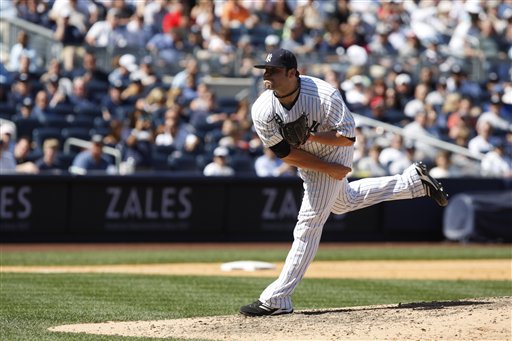
Even when the Yankees sweep an easy playoff series, controversy somehow manages to find the team. After all, baseball fans and reporters who face five and a half days without baseball have to find something to talk about during the downtime. The topic of the week, as it often is, will be Joba Chamberlain.
During the ALDS, only 18 of the Yanks’ 25 active players saw game action, and only seven pitchers — three starters, Mariano Rivera, David Robertson, Kerry Wood and Boone Logan — reached the mound. Absent among those was Joba Chamberlain, the once and, hopefully, future pitching stud. Of course, since Joba is Joba, that he didn’t pitch in the ALDS has elicited analysis of the moves and predictions of a Joba-less future for the Yankees.
The why of it is simple: Joba Chamberlain wasn’t in the Yanks’ plans for the ALDS, and the situation for him to pitch never arrived. In Game 1, Joe Girardi used his close-game staff. After CC Sabathia left in the 7th, Boone Logan came in for the lefties and David Robertson for the righties. For the 8th with a two-run lead, Girardi gave the ball to set-up man Kerry Wood, and Mariano got the ninth. In Game 2, Andy Pettitte went 7, and Wood and Mo closed out a three-run game. Joe Girardi’s strategy was not a mystery.
For Game 3, the circumstances changed. After Phil Hughes’ utterly dominant seven-inning outing, the Yanks had a 6-0 lead with six outs left. For the first time in the series, Girardi could have moved down the depth charts. He could have gone to Joba, but in the past, Girardi’s M.O. for playoff-clinchers has been a no-nonsense one. Mariano Rivera is always on the mound, and the top relievers get the ball before him. It’s not a surprise then that Girardi never went with Joba.
The Yankees and Joba had a difficult relationship in 2010. After he struggled as a starter at the end of 2009, Chamberlain spent the year in the bullpen, and he ended the season a 4.40 ERA but 77 strike outs in 71.2 innings. He cut his walk rates and his home run rates but seemed to meltdown at the wrong time. Still, over his final 30 appearances, Joba sported a 2.15 ERA and a 6:1 K:BB rate. He was a very good reliever down the stretch, but he hasn’t moved up on the depth charts.
Once the Yanks’ 2010 campaign is over, the team will have to address Joba’s future. As Ken Davidoff highlighted yesterday, Joba is arbitration-eligible this year and is due for a raise. As the Yanks showed with Melky Cabrera, they’re willing to trade players who are making more than the team feels they are worth, and Davidoff believes the Yanks will listen to offers on Joba and may be willing to include him in a trade.
But for now, there’s plenty of baseball left, and Joba will have his time to sink or swim. That he didn’t pitch in the ALDS simply means that the team’s other hurlers did their jobs and nothing more.
Hughes pitches Yanks to ALCS with win over Twins
It must feel like a recurring nightmare for Ron Gardenhire and the Twins at this point. They won 94 games and steamrolled the rest of the AL Central this season, then headed into the playoffs with homefield advantage and their best team in years. Three games and four nights later, they were again swept by the Yankees in the ALDS, and just one of the games was really competitive. Phil Hughes did the honors on Saturday, putting up zero after zero while the lineup scored run after run. Minnesota’s season is over, but the Yanks are just getting started.
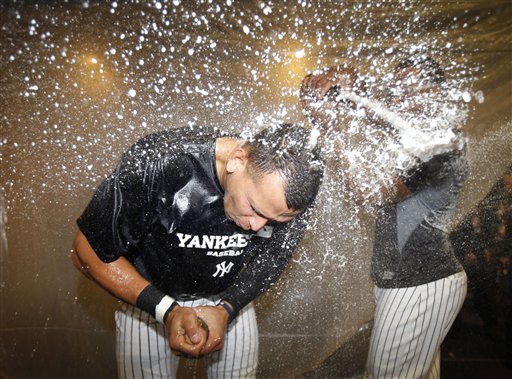
Biggest Hit: Happy Thames Are Here Again
For the first time since the 2003 ALDS, the Yanks scored first in a playoff game against the Twins. It’s a stretch that lasted nine games, but that all came to an end in the second inning when Jorge Posada singled in Robbie Cano following his leadoff triple. Two innings later the Yanks were up two-zip, and nice lead but certainly nothing that makes you rest easy that early in the game. Might mighty Marcus Thames changed all that with one swing.
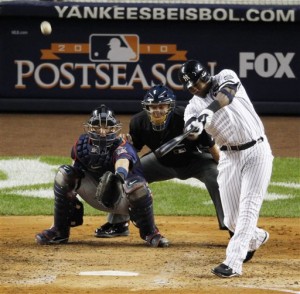
Minnesota starter Brian Duensing was fooling no one in this game, something that’s not uncommon for pitch-to-contact guys against the Yankee lineup. He threw 58 total pitches and didn’t get one swing-and-miss, and the beginning of the end all started when Cano reached first on a weak ground ball about 20-feet from first. Michael Cuddyer fielded the ball and tossed it over to Duensing at first, but the ball glanced off his glove and hit first base coach Mick Kelleher in … a vulnerable spot. I sure hope he iced down afterwards, and I’ll leave it at that.
As we chuckled at the replay of Kelleher getting hit, Thames wasted no time extending his team’s lead. Duensing left 91 mph sinker out over the plate and the designated hitter put his best swing on it, hitting a big fly into the rightfield people to give the Yanks a four run cushion. The Twins starter was out of the game two batters and one baserunner later, but this one was long gone by that point. Thames’ shot was for all intents and purposes the nail in the coffin. At .102 WPA, it was the biggest play of the game.
Honorable Mention: You’re On The Mark, Teixeira
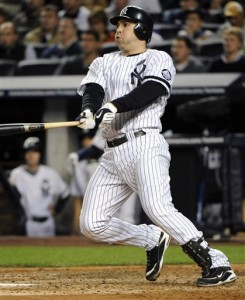
Everyone knew that a lone second inning run wasn’t going to stand up for seven innings, and two players who contributed surprisingly little the Yankees’ 2009 World Title run put another run on the board in the third.
Nick Swisher, who hit just .128/.255/.234 in last year’s playoffs, got the party started by lacing a double into the left-centerfield gap with two outs in the third. Mark Teixeira, who was slightly better than Swish last year at .180/.282/.311, absolutely annihilated a 1-0 fastball from Duensing, hitting it clear over Delmon Young’s head in left to score Swish. He hit it so hard that he was held to the single, but that was irrelevant. The run was in, and the lead grew.
Biggest Out: O-Dawg Kills The Rally Before It Even Starts
We’ll expand on this in a bit, but Hughes cruised right into the fourth inning without allowing a single baserunner. Denard Span changed that with a leadoff single to right, and with a two run lead all it would take was one swing of the bat to tie things up. Minnesota had the meat of their order coming up, so the situation could have gotten very dicey very quickly.
Instead of letting a bad situation snowball into a disaster, Hughes remained nice and calm and quelled the threat with one pitch. That pitch was a 93 mph heater on the outside corner to Orlando Hudson, who grounded it right to Derek Jeter for a rally killing 6-4-3 double play. It was that simple. Oh, you guys are threatening? No, let’s put an end to that. The double play improved the Yankees chances of winning by 9.0%, the second biggest play of the game.
Honorable Mention: Hughes Gives Kubel The Gas
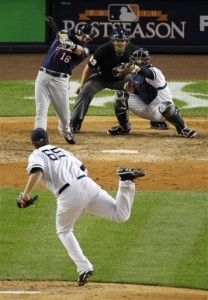
This one’s completely subjective, but that’s okay, we’re allowed to do that from time to time. After Thames and a few other guys helped push the lead to five-nil, the Yanks were simply looking to get outs as quickly as possible.The Twins started to mount a little two out rally in the sixth inning, when Hudson and Joe Mauer both singled to right. Phil’s pitch count was starting to climb, but he wasted no time putting Jason Kubel away. First pitch curveball dropped in for a strike, second pitch fastball was fouled off for strike two, and the kill pitch was a 93 mph heater up in the zone that garnered a swing-and-a-miss and the third out. That could have been the end of Hughes’ outing right there, but he was again able to bear down and escape the inning.
The Night He Became A Man
There’s something extra satisfying about watching a guy perform well on the big stage after you’ve followed basically his entire career. Phil Hughes is pretty much that first guy for a large contingent of Yankee fans, since he was drafted just as blogs and fan analysis brought prospects and minor league baseball to the forefront. We watched as Hughes made his rookie ball debut, as he tore through two levels of A-ball in one season, as the dominated guys two and three years older then him in Double-A. It was glorious.
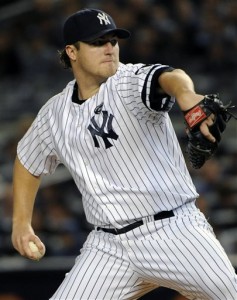
But we also dealt with the struggles, the injuries, and the failure to provide instant gratification. It wasn’t until two full years after his big league debut that he established himself as a Major Leaguer, and that didn’t happen until he moved to the bullpen. Hughes won a World Series ring last year, but his career progression didn’t end there. Not even close. He stepped back into the rotation this year, and delivered a masterpiece in the biggest start of his life.
Thirteen days after his last start, Phil took the mound in this game and was throwing grenades right from the start. The first nine batters were set down on just 31 pitches, and the lone baserunner he allowed in the fourth was erased on Hudson’s double play. He didn’t run into any real trouble until the fifth, which came after he sat on the bench for over half-an-hour while the lineup tacked some runs on the board. Hughes threw over 30 pitches that inning and nearly coughed up part of the lead, but he rebounded and gave his two more innings.
The end result was seven innings pitched, four singles, just one walk, and six strikeouts. He threw 99 pitches and 67 strikes, recording a game score of 74, his second highest of the season behind the near no-hitter in Oakland (that was an 80). The stakes were a bit higher this time out, so I’m going to make an executive decision to dub this his best game of the season. In fact, he became the first Yankee pitcher to go seven scoreless in a playoff game since Mike Mussina way back in Game Three of the 2001 ALDS. Yeah, it had been a while.
Phil Hughes grew up a little bit in this game. Well, he continued growing up I mean. He’s been doing it all season, but this was the biggest step forward we’ve seen. He was dominant and efficient, calm yet overwhelming, and quite frankly, he was an ace. After all we’ve gone through with Phil over the last six years, this was something special.
Leftovers
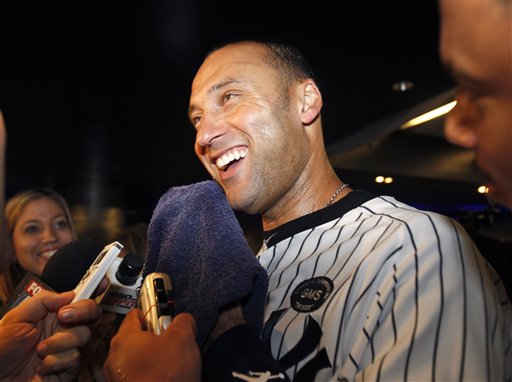
In hindsight, maybe using Kerry Wood three times in four days wasn’t such a good idea. However, both Boone Logan and David Robertson earned their pay checks tonight. They threw three pitches combined and recorded two harmless pop outs with the bases loaded in the eighth. Mariano Rivera was exceptionally sharp in the ninth, closing it out flawlessly. He retired nine of the 11 men he faced in the series, with one of the baserunners being erased on a double play and the other coming on a blown call (the Greg Golson shoestring catch). Mo’s back to being Mo, and not a second too soon.
Swish hit a solo homer late to give him three extra base hits in the series, the same number he had in the entire postseason last year. He hit .333/.385/.750 in the three games, but wasn’t nearly as good as Curtis Granderson, who hit .455/.500/.727 in the series. He singled and walked in this one, then stole a base and moved to third on the same play as the result of a throwing error, setting up their third run in the fifth inning. Derek Jeter had two hits, Cano had two hits, and Thames had two hits. The only Yankee that didn’t reach base in this game was Brett Gardner, but we’ll forgive him.
As for the Twins, they went just 2-for-18 (.111) with runners in scoring position during the series, the Yankees 9-for-25 (.360). Remember when everyone was worrying about that last month? Anyway, it’s also worth mentioning that the Yanks held Mauer and Jim Thome to .250/.308/.250 and .100/.308/.100, respectively. Kubel, a career .291/.354/.456 hitter against New York, was held to three walks and zero hits in 11 plate appearances during the series. Minnesota’s three big lefty bats mustered zero extra base hits. Shut right down.
Part of me feels bad for Gardenhire and the Twins, they have to be so mentally defeated by the utter lack of success against the Yankees for the last half-decade. They’re a great organization that consistently puts a winner out there year-after-year, but their shtick doesn’t work in the playoffs. Develop some pitchers that can miss bats, and maybe you’ll stand a chance next time.
Final note: The Yankees are now 8-1 in playoff games at the New Stadium. The only loss was to Cliff Lee in Game One of the 2009 World Series.
WPA Graph & Box Score
Love it, nice and easy. MLB.com has the box score and video, FanGraphs some other sweet stuff.
Up Next
Woooo six days off! The Yanks will play either the Rangers or the Rays in the ALCS when that series starts on Friday in either Texas or Tampa. For now they’ll just get some rest, throw some bullpens, take a bunch of batting practice, and ready themselves for the next step. This ALDS sweep was only the start of something big.
Yanks sweep Twins to advance to ALCS
ALDS Game Three: Twins @ Yankees
 For the first time since walking off the field as World Champions last November, the Yankees will play a playoff game in the Bronx tonight. They grabbed the first two games of the best-of-five ALDS in Minnesota in entirely different fashions, using their offensive might to out-slug the Twins in Game One before riding their pitching depth in Game Two. Should they win tonight, they’ll celebrate on home turf once again, though it’ll just be the first of what we hope are several celebrations this month. But let’s not get ahead of ourselves.
For the first time since walking off the field as World Champions last November, the Yankees will play a playoff game in the Bronx tonight. They grabbed the first two games of the best-of-five ALDS in Minnesota in entirely different fashions, using their offensive might to out-slug the Twins in Game One before riding their pitching depth in Game Two. Should they win tonight, they’ll celebrate on home turf once again, though it’ll just be the first of what we hope are several celebrations this month. But let’s not get ahead of ourselves.
On the bump for the good guys is the young Phil Hughes, who made it through his first full season as a starter in the AL East with flying colors. Sure, there were absolutely some bumps in the road, but the end result was a 2.4 fWAR season at age-24. Hard to complain about that. Hughes has had some a lot of trouble keeping the ball in the park at home this year (20 HR allowed in 106.1 IP), so he’s going to have to keep the ball down in the zone and away from the middle of the plate to keep Minny’s lefty power in check. With the bullpen fresh after an off day and Andy Pettitte’s stellar Game Two effort, all Phil needs to do is give them five strong. Anything beyond that is gravy.
The Twins are handing the keys to their season over to 27-year-old Brian Duensing. He’s the kind of lefty that can give the Yankees fits; he’s got a good changeup (0.98 runs above average for every 100 thrown this year) and he pounds the zone (2.07 BB/9 if you take out intentional walks), but at the same time he won’t miss any bats (just 5.37 K/9 with a below average 7.7% swinging strike rate). Duensing’s going to give the Yanks the opportunity to put the ball in play, and I’ll happily take my chances with that. For what it’s worth, the Yanks tagged him for seven hits and five runs in just 4.2 innings in Game One of last year’s ALDS.
Make sure you check out Joe’s preview over at FanGraphs, ditto Jack Moore’s for the Twins. Here’s the lineups…
Yankees
1. Derek Jeter, SS
2. Nick Swisher, RF
3. Mark Teixeira, 1B
4. Alex Rodriguez, 3B
5. Robbie Cano, 2B
6. Marcus Thames, DH
7. Jorge Posada, C
8. Curtis Granderson, CF
9. Brett Gardner, LF
Phil Hughes (18-8, 4.19 ERA)
Twins
1. Denard Span, CF
2. Orlando Hudson, 2B
3. Joe Mauer, C
4. Jason Kubel, RF
5. Delmon Young, LF
6. Jim Thome, DH
7. Michael Cuddyer, 1B
8. Danny Valencia, 3B
9. J.J. Hardy, SS
Brian Duensing (10-3, 2.62 ERA)
First pitch is scheduled for 8:37pm ET, and the game will be on TBS. Once again, Ernie Johnson, John Smoltz, and Ron Darling will have the call. Enjoy.
- 1
- 2
- 3
- …
- 5
- Next Page »
